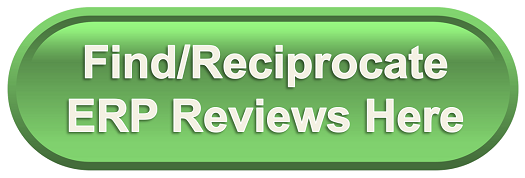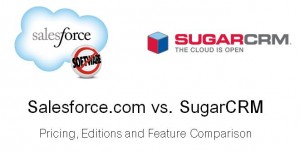Finding the right ERP system is a long process – wouldn’t it be great if you had a place like Amazon or Yelp to read to the point and unbiased reviews? We recently announced the launch of the new ERP software review section of our site – and we are really excited about it. Our aim is to deliver comprehensive ERP software reviews for small, mid and enterprise sized companies who are looking for software to improve their business and really want honest advice.

The new ERP software review portion of our site is designed to deliver valuable information for companies and organizations from diverse backgrounds seeking new business software to fit their distinctive needs.
We know that not everyone has the time or knowledge-base to select the right software solution for their individual needs. We are here to provide reviews and advice for companies and organizations seeking new software which is why our initial consultations with all prospects are completely free.
So if you are reading this post and have ever used an ERP system – please visit our ERP page and leave your own reviews! This part of our site can’t function without people like you. Your valuable input and advice will create an open source of discussion for current and future ERP software users.
In addition to the new ERP software reviews we will be offering more in depth vendor selection services very soon. We hope to roll out the new portion of our site by next week.
Submit reviews here.
One of the most frequently asked questions we get from clients is ‘which is better, Salesforce or Sugar?’
In fact, we find ourselves telling clients about the differences between them so often we decided to blog about it. So this is it, our no holds barred comparison on the differences and similarities of Salesforce and SugarCRM.
Let’s start with what they have in common – more than you than you might think. Both Salesforce and SugarCRM are pioneers in the CRM movement. They both challenge the Bill Gates Microsoft archetype and ascribe to the clean aesthetic of Steve Jobs’ Apple. Both were created in California. Salesforce is based in San Francisco and SugarCRM comes from Cupertino, California in the Santa Clara Valley – also the home of Apple Inc.
Now for the differences…

Editions and Pricing
Salesforce.com comes in five different editions, ranging in price from $24 per user per year to $3,000 per user per year. While all of the editions are – in their most basic forms – the same product, there are certain features and functions that are enabled or disabled, depending on the edition purchased. Without a doubt, Salesforce.com’s most popular edition is their Enterprise Edition. With a price point of$1,500 per user per year, it is their middle of the line solution. In comparison their second most popular instance the Professional Edition, is priced at $780 per user per year.
In comparison
SugarCRM has four different editions of their commercial product: Professional, Corporate, Enterprise, and Ultimate. They have a free open-source solution titled Community.
Sugar’s cheapest instance is Sugar Professional, with a price point of $360 per user per year. From there Sugar prices rise slowly – but at their most expensive, Sugar is still only half of the most expensive instance of Salesforce.com. Sugar Corporate costs $540 per user per year while Sugar Enterprise is priced at $720 per user per year and Sugar Ultimate costs $1200 per user per year.
Sugar licensing prices are constant no matter which of the four hosting options you choose. It should be said though that some hosting options, mean additional costs.
You can download a complete guide ‘salesforce vs. sugarcrm’ by clicking on the button below.
So your company has decided to switch enterprise resource planning (ERP) solutions – that’s great… but finding out which vendor to go with can often be a laborious and time consuming process. Over here at Softwarefit we have compiled a white paper outlining the top ERP software vendors in the marketplace today and given a full detailing of their capabilities and resources.

They are, in no particular order:
Let’s first take a look at Oracle
An American multinational computer technology corporation headquartered in Redwood City, California, The United States – Oracle specializes in developing and marketing enterprise software products – particularly its own brands of database management systems. Oracle is the third-largest software maker by revenue, after Microsoft and IBM.
Oracle has extensive experience building tools for database development and has focused on systems of middle-tier software, like enterprise resource planning software (ERP). Oracle has become one of the top ERP software vendors in the past decade.
What about SAP?
SAP is a German multinational software corporation known for their engineering of enterprise software to manage business operations and customer relations. Headquartered in Walldorf, Baden-Württemberg, Germany, with regional offices around the world, SAP is arguably the market leader of enterprise software and software-related service.
SAP is unquestionably known best for its ERP software systems and management tools. It is not possible to discuss ERP vendors without mentioning SAP, they have established themselves as the leading ERP vendor.
Microsoft – that older brother you can always rely…
Microsoft began producing a line of ERP and CRM software under the name Microsoft Dynamics, using a network of reselling partners to provide specialized services. Dynamics products use either Microsoft SQL Servers to store data. Perhaps their most popular ERP solution is Great Plains – it is one of four accounting packages acquired by Microsoft that now share the Microsoft Dynamics Business Solutions brand.
Microsoft Dynamics GP was originally developed by Great Plains Software, an independent company based in Fargo, North Dakota. First released in 1993 GP was a pioneer accounting package designed and written to be multi-user and to run under Windows as 32 bit software. Microsoft announced the purchase of Great Plains Software in 2000.
And then there is Sage – your quirky British uncle
Sage, a multinational enterprise software company based in Newcastle upon Tyne, in the United Kingdom is the world’s third-largest supplier of enterprise resource planning software – coming in just behind Oracle and SAP, and the largest supplier to small businesses. Sage can boast an impressive 6.1 million customers worldwide. With offices in 24 countries Sage is a widely respected ERP software vendor titan with an impressive reputation to boot.
To read out ten page comprehensive white paper on these top ERP software vendors click on the button below.

10 Questions To Ask Before Buying CRM
We hear the same thing from so many customers when they start their research into CRM software. “We want a CRM solution, but we don’t know exactly what we’re looking for.” Many people know they need CRM, but they don’t know which product is right for them or why.
We’ve always told people that most CRM products are fairly similar, but they all have individual nuances that tailor fit them to a business’s specific need. Finding CRM software is easy. Finding the right CRM software is difficult, but will pay you back with huge dividends.
That’s why Softwarefit has created a list of 10 questions you should ask before taking the next step in CRM selection. These questions will help eliminate software that doesn’t fit your specific requirements and point you in the direction of software that suits your needs.
If finding the right CRM is something you are seriously interested in, this whitepaper is a great place for you to start.

Here are a few examples of questions that should be asked:
Do you want your CRM system to be hosted or on premise?
Interested in an on-premise solution? If yes, you should think about why you’re considering an on-premise software. Some people think it will cost less if they host it themselves on site, which isn’t necessarily true, and dependent on the software. Often times, it takes several years for on-premise solutions to “pay for themselves” after licensing, server fees, and yearly maintenance fees are accounted for. Some businesses have sensitive data and worry about security issues on the cloud. If you want to host your CRM software, make sure the reason makes sense.
What Department is driving the CRM search?
It’s important to know why you need your CRM software. Is the push for new software coming from your IT department, sales team, marketing team, or customer service department? Each department has very specific needs out of a CRM solution. If the push for new CRM software comes from your marketing team, then it’s important your CRM solution has great Marketing Automation integration. If it comes from your customer service department, then ticketing, field service, and case escalation is vital. Make sure you know which department is spearheading this purchase so you know what features are the most valuable to you.
To read a list of all the questions to consider before buying CRM download our white paper here.





